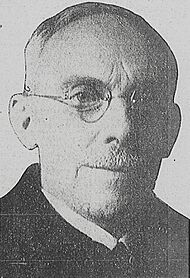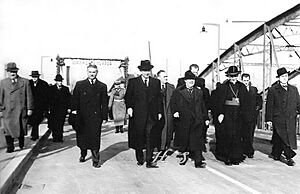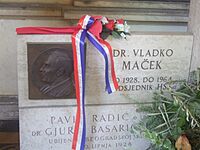Vladko Maček facts for kids
Quick facts for kids
Vladko Maček
|
|
|---|---|

Maček in 1939
|
|
| 2nd President of the Croatian Peasant Party | |
| In office 13 August 1928 – 15 May 1964 |
|
| Deputy | Josip Predavec August Košutić |
| Preceded by | Stjepan Radić |
| Succeeded by | Juraj Krnjević |
| Deputy Prime Minister of Yugoslavia | |
| In office 26 August 1939 – 7 April 1941 |
|
| Monarch | Peter II of Yugoslavia |
| Prime Minister | Dragiša Cvetković (until 1941) Dušan Simović (1941) |
| Preceded by | Office established |
| Succeeded by | Juraj Krnjević |
| Leader of the Opposition | |
| In office 13 August 1928 – 26 August 1939 |
|
| Monarch | Alexander I of Yugoslavia Peter II of Yugoslavia |
| Personal details | |
| Born | 20 June 1879 Kupinec, Croatia-Slavonia, Austria-Hungary |
| Died | 15 May 1964 (aged 84) Washington D. C., U.S. |
| Nationality | Croatian |
| Political party | Croatian Peasant Party |
| Children | 2 |
| Alma mater | University of Zagreb |
| Profession | Lawyer |
| Awards | Grand Order of King Dmitar Zvonimir (2004) |
| Military service | |
| Allegiance | Austria-Hungary |
| Branch/service | Army |
| Years of service | 1914–1918 |
| Rank | Captain |
Vladko Maček (born June 20, 1879 – died May 15, 1964) was an important politician in the Kingdom of Yugoslavia. This was a country that existed in Europe before World War II.
Maček led the Croatian Peasant Party (HSS) after its previous leader, Stjepan Radić, passed away in 1928. He became a very important Croatian political figure. He remained so until Yugoslavia was invaded in 1941. As the leader of the HSS, Maček helped create the Banovina of Croatia in 1939. This was a special area in Yugoslavia that had a lot of self-rule.
Contents
Early Life and Education
Maček was born in a village called Kupinec, near Jastrebarsko, which is southwest of Zagreb. His father, Ivan, was from Slovenia, and his mother, Ida, had both Croatian and Polish family roots.
When he was six, Maček started elementary school in Kupinec. Later, his father, who worked for the government, moved the family to Zagreb. There, Maček went to a gymnasium, which is like a high school. He finished when he was 18.
After high school, he studied law at the University of Zagreb. He earned his law degree and then worked in different courts in Croatia. In 1908, he opened his own law office. He joined the Croatian Peasant Party when it was first started.
Serving in World War I
When World War I began, Maček was a reserve officer. This meant he could be called to serve in the army. On July 27, 1914, he joined the Austro-Hungarian Army. He was a commander of a company of soldiers.
Maček fought in the Serbian Campaign. He was hurt in November during the Battle of Kolubara. After recovering in the hospital, he was given an award for being brave. He was also promoted to a higher rank. Because of a problem with his eyesight, he could not fight on the battlefield anymore.
He was then put in charge of a company of engineers. These soldiers built things like defenses. He worked on defenses for Budapest and later for the port of Pula. He served there until the autumn of 1916. He also spent some time in Albania with the occupying forces.
After the First World War
After World War I, Maček became a close helper to Stjepan Radić. Radić was the leader of the Croatian Peasant Party. In 1925, after Radić visited Moscow, Maček was arrested by the authorities in Yugoslavia.
Even while he was in jail, people voted for him to be part of the National Assembly. In July 1925, the Croatian Peasant Party joined the government, and Maček was set free.
Leading the HSS and the Banovina of Croatia

Maček became the leader of the Croatian Peasant Party on August 13, 1928. This happened after Radić passed away. Maček quickly became a main opponent of King Alexander. In April 1933, he was arrested and spent three years in jail.
Maček was released after King Alexander passed away in 1934. During this time, Maček wanted to change Yugoslavia. He hoped to make it a country where Croatia would have its own statehood again. Most Croats liked his ideas, and the Croatian Peasant Party became more and more popular.
He worked closely with other opposition parties in Yugoslavia. Even though his group lost elections in 1938, they were still a strong force. His hard work paid off in August 1939. He reached an agreement with Dragiša Cvetković. This led to the creation of the Banovina of Croatia. This was a special area that included Croatia and parts of what is now Bosnia and Herzegovina. It had a lot of self-rule. The HSS became part of the government, and Maček became the Deputy Prime Minister of Yugoslavia.
World War II and Its Impact
This success did not last long. The Banovina of Croatia, along with all of Yugoslavia, fell apart in April 1941. This happened when the Axis countries invaded Yugoslavia. Nazi Germany saw Maček as a good leader for a new state they wanted to create. This state was called the Independent State of Croatia.
Maček was offered the chance to become prime minister twice, but he said no. He asked his party's supporters to work with the new government. At the same time, he sent Juraj Krnjević to represent the Croatian people in the Yugoslav government that was in exile.
Maček's plan did not work out well for him or his party. In October 1941, he was arrested. He was held in a place called Jasenovac concentration camp for some time. Five months later, on March 16, 1942, he was placed under house arrest. This meant he had to stay at his home in Kupinec with his family.
His family stayed with him during this time. The Croatian Peasant Party started to split apart. Some members joined the Ustaše, while others joined Tito's Partisans. Maček was against both groups. In 1945, he moved away, first to France, and then to the United States.
Later Life and Legacy
On June 12, 1945, Maček met with the French foreign minister. He was offered the right to live in France. He visited the United States for the first time in 1946. He received a special visa to enter the country. He was welcomed by the mayor of Pittsburgh when he gave a speech there.
Maček helped start the International Peasants' Union in 1947. He was offered leadership roles in many Croatian groups living outside of Croatia, but he turned them down. He passed away from a heart attack in Washington, D.C., on May 15, 1964. He was 84 years old.
In 1996, his remains were brought back to Croatia. He was buried in the Mirogoj cemetery in Zagreb. In 2004, he was given an award after his death, called the Grand Order of King Dmitar Zvonimir.
Images for kids
See also
 In Spanish: Vladko Maček para niños
In Spanish: Vladko Maček para niños
- Stanisław Maczek, Vladko Maček's cousin
 | Janet Taylor Pickett |
 | Synthia Saint James |
 | Howardena Pindell |
 | Faith Ringgold |





